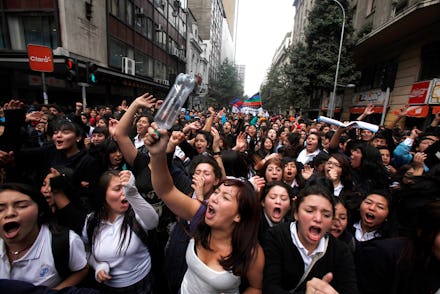What I Say to Millennials Who Protest, But Don't Want to Vote

I couldn’t help but feel there was a contradiction in former socialist president Michelle Bachelet's victory in the first round of Chile’s presidential election, held on November 17, which was marked by a 50.7% abstention rate.
The contradiction I’m talking about lies in the low rate of participation among millennials, who became a symbol of defiance against the system from April to June 2006, following the wave of nationwide student protests known as the "Penguin Revolution" — in reference to the color of high school uniforms — demanding better, more inclusive education standards and the end of for-profit schools and universities. Their slogan was “free, quality education for everyone”.
With six major demonstrations in 2013, the movement and its leaders have been very active in positioning their demands in the public eye and the political arena ever since. Additionally, there were nine candidates in total for the first round, four of which were more or less in line with the students’ structural criticism to the neoliberal free market economy put in place by late dictator Augusto Pinochet in 1973.
Image Credit: Federación de Estudiantes de la Universidad de Chile
Therefore, the country and certainly I was expecting to see — perhaps with reason, perhaps not — droves of young people at voting booths looking to change the system.
But things turned out different. Chile will hold its first-ever presidential runoff between two women, Michelle Bachelet and right-wing economist Evelyn Matthei, today.
The abstention rate in the first round was the highest in a presidential election since Chile returned to democracy in 1990, and both candidates scrambled to draw more people to the polls. However, despite their best efforts, some say it could be as high as 59% on Sunday.
There are many factors that explain this massive abstention rate. For starters, Bachelet’s victory in the runoff is a virtual certainty: The latest Ipsos–Usach poll predicts she will win with 63.7% to 66.3% of the votes.
It’s the mother of all spoilers. Local political analyst Mirko Macari has described this election as completely boring and devoid of tension or an epic element.
And there is the profound disconnect between common people and the political duopoly that governs the country, which has done little to change the binominal election system that binds the nation's government to the status quo.
The nationwide UDP university poll, published in September, indicated trust in political parties decreased steadily from 9.4% in 2008 to 7.1% in 2013. It hit an all-time low of 4.4% in 2012.
While it may seem this election has been reduced to choosing between the lesser of two evils, there is a “third option” that makes it worthwhile to go vote this Sunday: The "AC" vote — for asamblea constituyente, or constituent assembly —, the stamp of the Marca Tu Voto (Mark your Vote) campaign, created by a collective of social leaders, independent citizens, and political organizations of various leanings "who agree on the need to address the serious problems affecting our political system."
According to the organization, “AC” votes amounted to 8% in the first round — 0.81% more than the five candidates with the lowest vote count — and the electoral service has said they are valid, as long as they state a clear preference.
The campaign organizers expected to obtain 150.000 votes in the first round, but they totaled more than 400.000. AC votes may increase in the runoff, since citizen observers counted only 38% percent of the polling stations partly because of political interference.
In light of all this, I think the biggest question — from a generational point of view — right now is: Do millennials think their vote can make a difference?
Part of the answer is in the municipal elections of mid-October 2012, the first to be held under the voluntary vote act effective on January of that year. Some hoped it would increase participation in politics by adding more people to the voter rolls.
However, a poll of 952 people between ages 18 and 29 conducted in August that year showed this wasn't going to be the case.
Of those polled, 45% said they wouldn't vote, 54% didn't relate to any political position and 49% deemed it impossible to exert influence in politics. As such, abstention was the big winner of the 2012 municipal election: 60%.
Fast forward to today, and I think it's safe to say we will see more of this. We saw it on November 17.
But times have changed and we should turn our gaze from the voting booths to the streets, where people don't need to vote or ask for permission to be heard. Abstention is not equal to apathy, this I know.
However, I think there's still huge power in a vote, especially now if it's marked "AC". Politics are way too important to be left in the hands of politicians, and Chile needs to reach another tipping point to solidify the shift brought about by millennials with the "Penguin Revolution", but we are not quite there yet. That's why I will vote, and that’s why millennials should seize this chance and do the same.